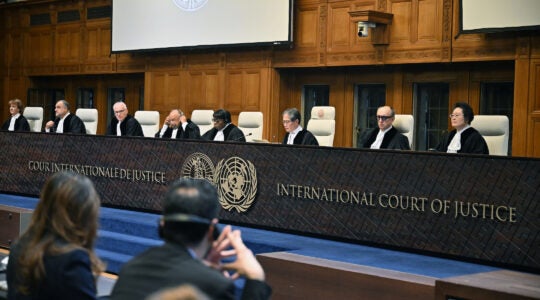JERICHO, West Bank (JTA) — The Intercontinental Hotel Jericho’s towering brick palazzo, flanked by a row of palm trees leading to an ornate archway entrance, seems the very epitome of desert luxury.
But inside, the hotel lobby — replete with marble floors and plush armchairs — stands empty on a recent weekday morning, save for a lone tourist rushing through wrapped in a towel.
General manager Hisham Nammari said the hotel’s 181 rooms are sometimes full during the summer and that business is generally good, though he has a habit of qualifying all his assessments with the phrase “for Jericho.” There have been a lot of tourists in recent years — for Jericho. The lobby is nice — for Jericho.
“Life is hard here,” Nammari said. “The city needs to grow more, to expand business. This city used to be great.”
Opened in 1998, the hotel may be the grandest symbol of what thus far has been a failed experiment.
Under the terms of the 1993 Oslo Accords, which were signed 20 years this month, Jericho was the first West Bank city in which Palestinians were granted full civil and security control. Developers hoped the hotel and the Oasis casino next door would help transform this dusty desert city of 22,000 into a resort destination.
Nammari still dreams of Jericho becoming a “little Las Vegas,” but the city remains a backwater. Its commercial district is small and unemployment is high. The casino, closed by the Israeli army in 2000 for security reasons, remains shuttered. And officials say that despite two decades of self-rule, Israeli restrictions still impact daily life here.
“Some sectors have improved, but not very fast,” said Kazem Muaket, who manages the local Chamber of Commerce. “We don’t feel the improvement of tourist movement here. It has not increased in a way you could notice.”
Billed in tourist materials as the world’s oldest city, Jericho has a rich biblical past and draws a reported 1 million visitors every year. But the city has the intimate feel of an Israeli development town – small, inexpensive, with little going on.
Municipal offices, a bank and some trendy clothing stores cluster around the town square. On adjacent streets, men hawk their wares on the sidewalk or sit around sipping coffee.
According to Jericho’s mayor, Mohammad Jalayta, the unemployment rate in the city stands at 30 percent. The city doesn’t track poverty, but Jalayta says the rate is “too high.”
Muaket did note some recent improvements, like an increase in Chamber of Commerce membership, from 300 to 500, since the Palestinian administration took over. An agricultural industrial park is set to open by next year. Jalayta also says the city has more schools, hospitals and factories than it did under Israeli rule.
“There are many changes that have occurred in Jericho,” Jalayta said. “Most of them are positive changes. Our vision is to search for sustainable benefit projects.”
He doesn’t have to look far. In the city center, several streets lack signs or crosswalks. Streams of litter line some side streets, and there is no intercity or local bus service. Reaching Jericho without a private car requires a taxi, and the fares change depending on the driver.
Residents blame most of the city’s problems on Israel. The city feels occupied, Jalayta says, because Israeli army patrols enter unannounced. Farmers complain they can’t profitably raise certain crops because Israeli water charges are too high. Exports from the West Bank are heavily restricted.
Even the simplest aspects of business are complicated, says Fadi Aljerashi, who owns a concrete mixing company here. The hourlong daily commute from his home in Bethlehem is sometimes twice as long as it should be due to an Israeli checkpoint.
“We don’t have our own borders,” Aljerashi said. “Now they can come inside the Palestinian Authority areas anytime, so still we are under occupation.”
Hasson, 24, a horse trainer who declined to give his last name, recently returned from New York because he prefers the relaxed pace of life here. He recalls a time when Israelis freely traveled to Jericho to see his horses.
Today, Hasson says he feels like he lives in a prison.
“Have you seen the big wall? We don’t live in our own country,” he said.
Like Israelis, many residents are skeptical that the latest round of peace talks between Israel and the Palestinian Authority will be more fruitful than the preceding failed rounds. But Muaket says that while the city still has a long way to go, the fitful progress of the past two decades gives him some measure of optimism.
“We are like any people of the world,” Muaket said. “We like to live in peace, in freedom. We want a good atmosphere for our children. We are not living in heaven, but it’s improved from what it was.”
JTA has documented Jewish history in real-time for over a century. Keep our journalism strong by joining us in supporting independent, award-winning reporting.





